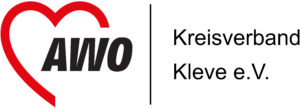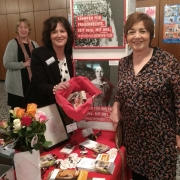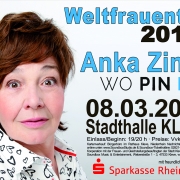The AWO District Association Women’s Shelter
Nina Buil and Andrea Hermanns, leaders of the women’s shelter
Office hours:
Mondays to Thursdays, 9am to 4pm
Fridays, 9am to 2.30pm
Advice
Any woman who is affected or threatened by physical and / or psychological violence can obtain information and advice. The first contact takes place by phone.
You can also email us: awo-frauenhaus.kleve@t-online.de
Consultations are free and confidential.
Admission:
Admission to the women’s shelter is possible at any time of the day or night, regardless of nationality, religion or income.
An employee will pick you up and your children at an agreed meeting point and bring them to the house. If all rooms in our house are occupied, we will provide you with telephone numbers of surrounding women’s shelters.
At www.frauen-info-netz.de you will find women’s shelters that have free capacities.
Our range:
The women’s shelter is a sheltered living space. The address of the house is anonymous and will not be disclosed to third parties. If necessary, there is a quick connection to the police.
You can move in alone or with your child(ren) to one or more rooms in the house. The kitchen, living room and bathrooms are shared. Women take care of themselves and their children.
There are regular counselling sessions with employees of the women’s shelter.
We support and accompany you with:
- securing a livelihood
- the clarification of your Living Situation and the housing search
- the search for counselling centres and institutions
- authorities, doctors and lawyers
- questions About maintenance, custody, Separation and divorce issues
- immigration law matters
- educational issues
- life after the Frauenhaus
Children
Children who have witnessed violence or been victims to it have to deal with a separation from their usual environment. Children have their own premises in the women’s shelter and they have the opportunity to express and work on their experiences there. Care time is offered for preschool and school children, with daily homework help.
If possible bring your own:
- Card / passport
- Health insurance card
- Earnings certificates, approval certificates
- Tax card, pension insurance documents
- Birth certificate, marriage certificate
- Testimonies
- Money, credit card, passbooks
- Statements of the last three months
- Rental contract
- Medical certificates
For children
- Child benefit number of the family fund
- ID cards
- School supplies
- Toys
Public relations:
Information events, round tables, information stands on the work of the women’s shelter and on domestic violence take place after consultation. Please contact us in this regard.
The employees take part in Round Tables in the district of Kleve for a nonviolent home. (See: www.zuhause-gewalt.de)
Volunteers
Volunteers support us at night, on weekends and on public holidays. They can then be contacted by phone to ensure that women at risk are received at all times during the day and night. If you are interested in volunteering and want to participate, please call during our office hours.
Internships:
Students and pupils have the opportunity to complete a one-year socio-pedagogical / social work placement.
Donate:
Without donations, the operation of the women’s shelter is not guaranteed. Your donation means a lot and is tax deductible.
Donations account:
Sparkasse Kleve
IBAN: DE77 3245 0000 0000 1143 97
BIC: WELADED1KLE
Or:
Become a member of the
AWO Women’s Shelter Association..
News
Frauenhaus stellte seinen Jahresbericht 2018 vor
Andrea Hermanns, Leiterin des Klever Frauenhauses, hat jetzt im Rahmen eines Pressegesprächs auf das Geschäftsjahr 2018 zurück geblickt: Die 20 Betten für insgesamt maximal 8 Frauen und 12 Kinder seien das ganze Jahr über „gut ausgelastet“ gewesen.
Hermanns berichtete ausführlich über zwei neue gesetzliche Vorgaben, die auch das Klever Frauenhaus in der nächsten Zeit tangieren werden – die „Istanbul-Konvention“, welche Grundsätze der Frauenhaus-Arbeit auf Europa-Ebene in den Fokus nimmt, sowie die NRW-Zielvereinbarung, laut der in den Frauenhäusern des Landes mehr Platz bei verbesserter finanzieller Situation geschaffen werden soll. „Insgesamt geht es um 50 Plätze landesweit, der Bedarf hierfür ist angefordert, die Bewilligung indes fehlt noch“, so Hermanns. Insofern sei auch noch nicht klar, was die Zielvereinbarung konkret in Zahlen für das Klever Frauenhaus bedeuten wird.
2018 wurden 36 Frauen und 28 Kinder aufgenommen, die meisten Frauen waren zwischen 20 und 40 Jahren alt. Die Kinder besuchten mehrheitlich noch nicht die Schule, das älteste Kind war 14 Jahre alt. 18 Frauen hatten die deutsche Staatsangehörigkeit, 24 eine andere . „Die Aufenthaltsdauer rangierte zwischen wenigen Tagen bis hin zu mehr als einem Jahr bei einer Frau“, ergänzt Hermanns. Solche langen Phasen ergäben sich unter anderem, weil Unterhaltsstreitigkeiten geklärt werden müssten, Gerichtstermine anstünden, Gutachten zu erstellen seien.
Zum Personal gehören 2 staatlich anerkannte Sozialpädagoginnen, eine Erzieherin, je eine halbe Stelle Verwaltungskraft und Hauswirtschafterin, 2 Praktikantinnen sowie 13 ehrenamtliche Kolleginnen.
Das AWO Frauenhaus eröffnete 1982. Es ist eine stationäre Einrichtung, in der von häuslicher Gewalt betroffene Frauen mit ihren Kindern Schutz, Beratung und Unterkunft erhalten. Der Aufenthalt bietet den Frauen die Möglichkeit, sich mit ihrer Situation auseinander zu setzen und bestenfalls neue Lebensperspektiven zu entwickeln.




